Turkey tail mushrooms have long been regarded as one of the most well-documented and highly tested mushrooms for immunotherapy and cancer treatment supplementation.
With the high levels of cancer fighting beta-glucans and antioxidants present in this mushroom species, turkey tail mushrooms can help cancer patients recovering from treatment and aid in general health and well-being when taken regularly.
If you’re looking to add turkey tail supplements to your daily regimen, this is a great blog post to discover what specific health needs this mushroom can assist with.
But first, let’s quickly recap what a turkey tail mushroom is before we dive into all of the health benefits of turkey tail mushrooms.
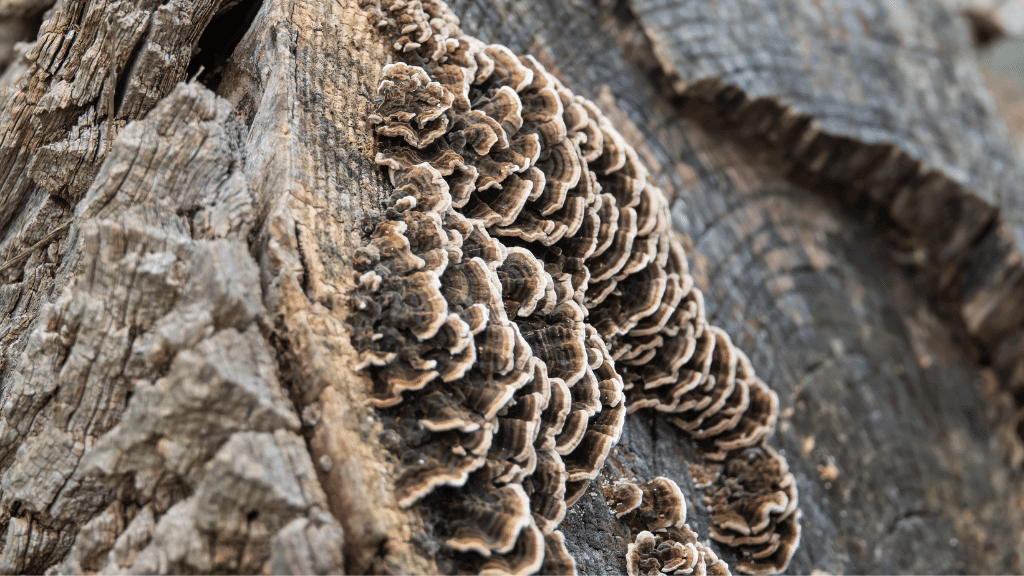
What are turkey tail mushrooms?
Turkey tail mushrooms (Trametes versicolor) are a colorful mushroom species - showing brown, tan, and gray fans of color - that can be foraged in forests all over the globe. Turkey tail mushrooms are non-hallucinogenic and can be found living on decayed logs of hardwood trees (e.g., Oak Trees) that grow in North America, Asia, and Europe. The fruiting bodies are sweet and mild in taste, and are processed to be sold commercially in supplemental product types such as powders, tinctures, extracts, and/or capsules.
Turkey tail mushrooms are proven to be packed with antioxidants and have one of the highest percentages of beta-glucans (more than 50% of the mushroom’s makeup) of any other mushroom. This is what makes turkey tail mushrooms such a great mushroom species for everything from everyday healthcare needs to more acute cancer treatment needs.
So let’s talk about potential benefits.
What are the health benefits of turkey tail mushrooms?
1. Immune Booster Packed with Polysaccharopeptide
Turkey tail mushrooms - especially compared to other medicinal varieties - have been rigorously tested to better understand the genetic makeup of the mushroom so we can fully unlock its health benefits.
In fact, of all the mushrooms on the market today, turkey tail mushrooms have been the species tested most for medicinal qualities. Through this research, we’ve found that turkey tail extract contains Krestin (PSK) and Polysaccharide Peptide (PSP) - both of these compounds promote immune response by activating certain immune cells and, in tandem, suppressing inflammation cells. These immune boosting compounds make turkey tail a great mushroom choice for supporting and/or treating:
- Cancer treatment when taking alongside chemotherapy
- This includes treatment for lung cancer, breast cancer, leukemia, and more
- Immunotherapy
- Gut health
- Antibacterial properties (e.g., salmonella or staph)
- Efficacy of certain cancer treatments
- Combatting HPV
- Inflammation
- Athletic performance (increased energy)
- Insulin resistance
- Phlegm reduction
- Pulmonary disorders
Using turkey tail to support you in treatment for any of the above is due to a high level of antioxidants found in turkey tail mushrooms. Let’s review that next.
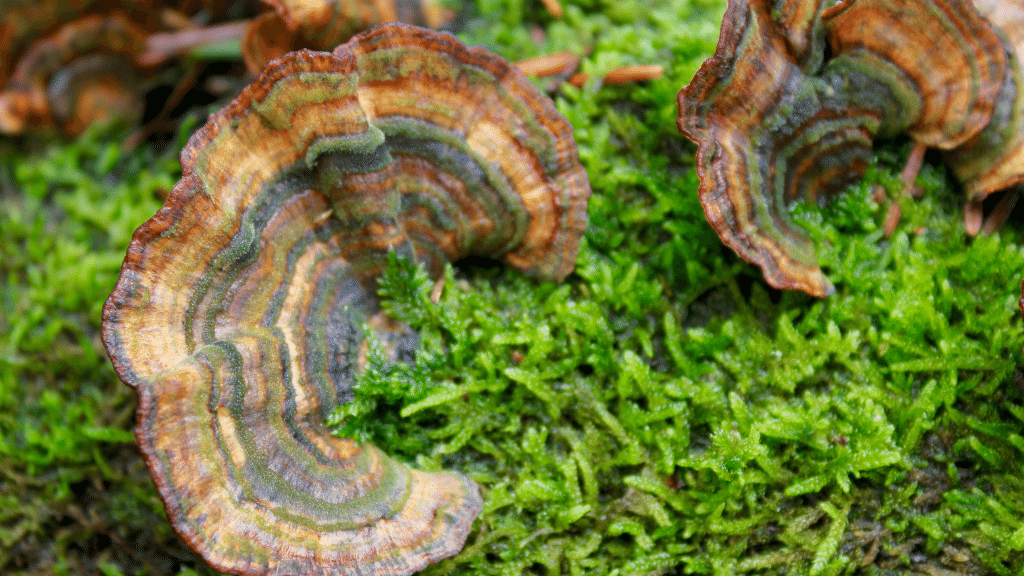 2. Antioxidants
2. Antioxidants
Antioxidants are compounds found in certain foods that help inhibit or reduce damage from oxidative stress on the body - oxidative stress is linked to an increased risk of developing cancer or heart disease.
Turkey tail mushrooms are chock full of antioxidants, including phenols and flavonoids proven to help ward off oxidative stress cells, reduce inflammation, and release protective compounds in the body.
In fact, a study found that one sample of turkey tail contained over 35 different antioxidant (phelonic) compounds! Let’s take a look at the way these antioxidants have been proven to help with specific health ailments.
3. Anti-tumor properties for cancer treatment
On top of turkey tail being one of the most rigorously tested mushrooms as a whole, in particular, there have been over 40 clinical studies done with 18,000+ participants to prove that it’s a valuable supplement for cancer.
While numerous mushrooms are noted to have cancer thwarting capacity, because of the high levels of beta-glucans in turkey tail mushrooms, they’re considered the most effective mushroom of all for cancer treatment.
As we delve deeper into turkey tail mushroom research and learn more about its active beta-glucans, we’ll be better able to understand the preferred way for growing the mycelium or fruiting body to process them and create extracts for prevention and wellness care.
As a whole, PSP and PSK have been shown to enhance white blood cell creation in the body and help support immunotherapy as a whole in cancer patients, helping them recover and improving survival rates. We’ve provided an overview of some notable studies conducted on turkey tail usage in cancer treatment to-date:
- Antitumor: In a study conducted on PSP effects on anti-tumor properties, it was found that PSP increased white blood cell count, making it an effective treatment enhancer.
- Colon cancer: In a study that measured PSK effectiveness in treating colon cancer cells, it was found that PSK suppressed the development of new colon cancer cells.
- Gastric cancer: In Japan, a study was conducted on 262 patients that were randomly assigned either standard gastric cancer treatment or treatment supplemented with PSK. Results showed that PSK improved both the five-year disease-free rate and five-year survival rate overall.
- Leukemia: When looking at turkey tail as a potential treatment for leukemia, scientists conducted an in-vitro study (e.g., a study conducted on cells outside of a living organism). Over a three-day period, growth suppression and viability of the leukemic cells was shown.
- Breast cancer: In a study conducted on women diagnosed with breast cancer stages 1 through 3 who had undergone surgery and chemotherapy, 9 grams of turkey tail was given daily to measure immune response. It was shown to be safe and effective, with positive indication that supplementation helped with immune response.
Check out our complete guide to using turkey tail to support your cancer treatment here.
And if you're wondering if turkey tail mushrooms can benefit your dog, check out this article.
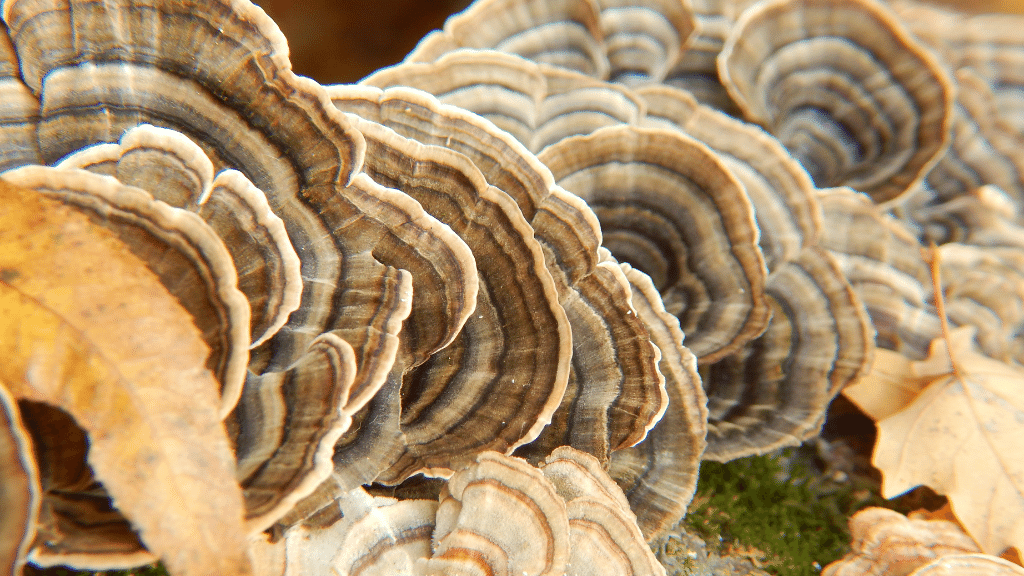
4. Prebiotics and gut health
Beyond the amazing antioxidant capacity of turkey tail mushrooms, the species also contains prebiotic dietary fibers that help to nourish healthy bacteria. The presence of these prebiotics make turkey tail a great mushroom for potentially supporting gut health.
Positive gut health effects were shown in a study where 22 of 24 patients were randomly given turkey tail mushrooms (PSP) to support a healthy gut microbiome over an eight-week period. The presence of PSP was shown to reduce the growth of potentially problematic E coli and Shigella bacteria.
HPV and other viruses
A recent study looked at the efficacy of turkey tail mushrooms in treating 61 people with HPV. Results found that 88% of participants treated with turkey tail were given clearance of HPV, compared to just 5% of the control group who did not receive turkey tail mushroom supplements.
We wrote a complete guide to using turkey tail for HPV here.
Antibacterial benefits
In a test-tube study that used turkey tail extract, scientists measured Staphylococcus and Salmonella bacteria growth that can cause illness and infection. For both bacteria, turkey tail was shown to have antibacterial benefits.
Reduce inflammation
With antioxidants proving to be a strong contender for fighting chronic inflammation in the body, it was hypothesized that consumption of turkey tail mushrooms - which are full of antioxidant compounds - would also be a good inflammation reduction treatment choice. This in-vitro study using the fruiting bodies of turkey tail showed that the compounds found in the mushroom helped with inflammation.
5. Potential Diabetes & insulin benefits
Turkey tail has been shown to help with insulin resistance and type 2 Diabetes outcomes. In this study, turkey tail extract reduced blood sugar levels and improved insulin resistance significantly.
Before taking turkey tail supplements
Please note that while a few of the studies noted above were done on humans, most studies conducted on turkey tail to-date have either been done on mice or in-vitro. More research is needed in order to support the health benefits for humans noted above, but these studies show a promising start for mushroom research and for using turkey tail extract as a cancer-fighting compound.
Please talk to a trusted healthcare professional beforehand when considering adding turkey tail supplementation into your own health and wellness regimen.
What to look for in a turkey tail product
When looking for commercially sold turkey tail products, there are a few considerations to take under advisement:
Find a trusted brand
Finding your trusted brand of mushroom products depends on a few things, but a good place to start is by reading reviews of different companies from consumers that have tried their products. When doing this, take all super positive and super negative reviews with a grain of salt and look for reviews that provide analysis of the company’s products in a balanced way.
We've put together our own list of the best mushroom products on the market -- check it out here.
Review the product’s ingredients
You’ll want to look behind the curtain at how the company creates its products and at the creation process itself before purchasing any mushroom products.
For example, with turkey tail, a supplement product that contains both fruiting bodies and mycelium is preferable over a product that just has one or the other.
As another example, when looking at commercial turkey tail products, capsules derived from mycelium grown on rice may contain fewer beta-glucans and higher levels of starch. Ingredient use and product makeup is a little look inside at how a company creates its products and what standards you require for your mushroom supplements.
Evaluate the certificate of analysis
Legitimate mushroom companies will publish a certificate of analysis (CoA) that details the testing process, ingredients used, and methodology for their products. The CoA can give some peace of mind that you’re choosing a product that’s been highly tested and contains only the good ingredients you’re looking to put into your body.
For turkey tail, specifically, you’ll want to find a product that has a guaranteed beta-glucan analysis of 15% or higher. If you’re planning to use turkey tail as part of a treatment plan, you may want to find a product that’s higher in beta-glucan content.
Look for proper extraction
When reviewing a product, the extraction process will be broken down for you in the CoA provided by the company (see above for details).
If the extraction process is important to you - and especially if you’d prefer an extract over a tincture - ensure you’re reviewing the company’s extraction process. For turkey tail, you’ll want to look for a hot water extraction process because beta-glucans are not alcohol soluble. If you’re using a tincture, be sure to analyze the extraction process in greater detail to ensure it’s a dual extraction with water and alcohol.
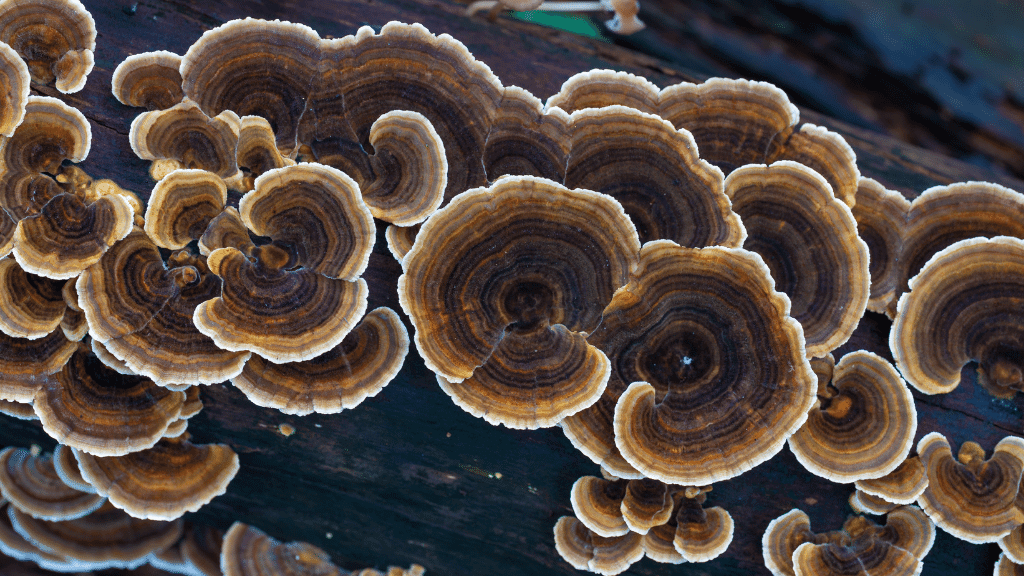
How much turkey tail should I take?
Dosage varies based on the turkey tail supplement product type and what you’re treating. Please consult your physician as well as the directions on the product you take. Researchers typically recommend that 2 grams daily is a good dosage to maintain overall physical health and wellbeing.
For more detailed information about recommended dosing by product, please see below:
- Turkey tail powder dosage: It’s recommended to start at 1-3 grams of turkey tail powder daily and increase after baseline tolerance is established.
- Turkey tail extract dosage: The general rule of thumb is to take 1mL of turkey tail extract (approximately 45 droplets) two times daily.
- Turkey tail extract capsule dosage: Recommended dosage is two “00” (e.g., 500 mg) capsules daily.
- Turkey tail tincture dosage: Dosage will vary by bottle and product, so please consult the directions before taking - dosage will resemble turkey tail extract dosage (e.g., 1mL of turkey tail extract - approximately 45 droplets) two times daily). Turkey tail tinctures are considered inferior to turkey tail extracts because active beta-glucans are not soluble in alcohol. This may mean that dosage is not as effective as other supplement types and should be adjusted accordingly.
- Cancer patient dosage: Please consult a trusted healthcare professional before starting to take turkey tail alongside chemotherapy and/or replacing your cancer treatment with turkey tail supplementation. Especially if you are on medications or are pregnant or breastfeeding. As an adjunct to chemo, turkey tail extract (PSK) can be dosed at 3 grams daily orally for up to seven years to help with postsurgical colon, colorectal, and gastric cancer care.
We know that starting a turkey tail supplement routine can feel daunting. That's why we put together a complete guide to taking turkey tail supplements here.
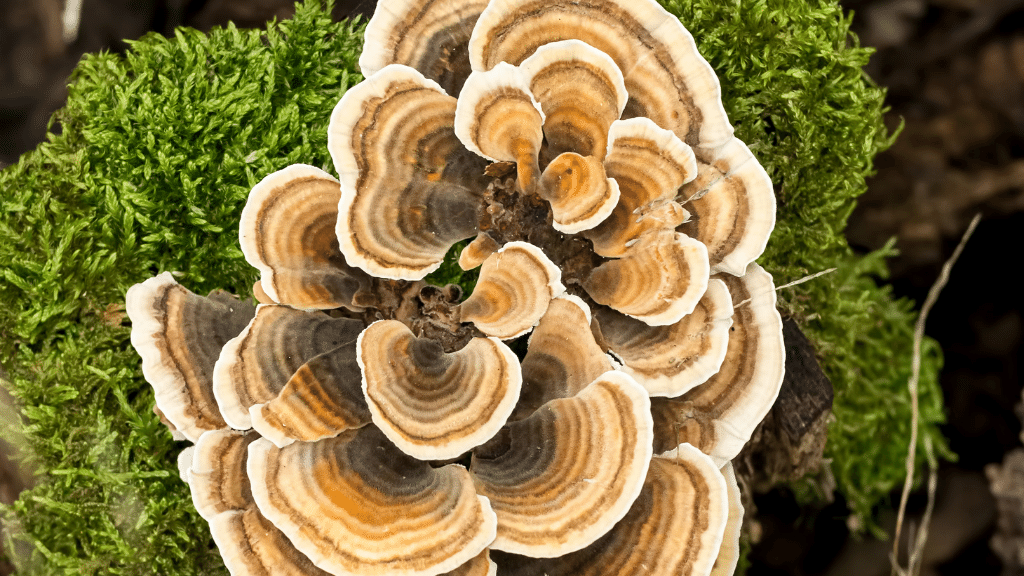
What are the side effects of turkey tail?
Although most studies done on turkey tail mushroom supplementation have shown promising health results, especially for cancer treatment, immunotherapy, and viral care, turkey tail products are not FDA approved at this time.
The good news is that, despite turkey tail being rigorously tested, there are very few side effects documented for those who have taken it.
People with pre-existing health conditions or those who are allergic to mushrooms or mold should consult a trusted healthcare professional before consuming turkey tail. The six documented potential side effects of taking turkey tail include:
- Heartburn
- Cold/flu symptoms
- Constipation and stomach pain
- Rash
- Darkened nail pigmentation
- Diarrhea (darkened stool)
It is recommended to avoid taking turkey tail mushrooms if you are pregnant or breastfeeding.
You can learn more about the potential side effects of turkey tail mushroom consumption, but checking out our article on this topic
Taking turkey tail mushrooms daily
All and all, turkey tail mushroom has an impressive array of health benefits with very few (if any) documented downsides to consumption. If you’re interested in learning more about taking turkey tail mushrooms, check out our blog post: The Guide to Taking Turkey Tail Mushroom Supplements.

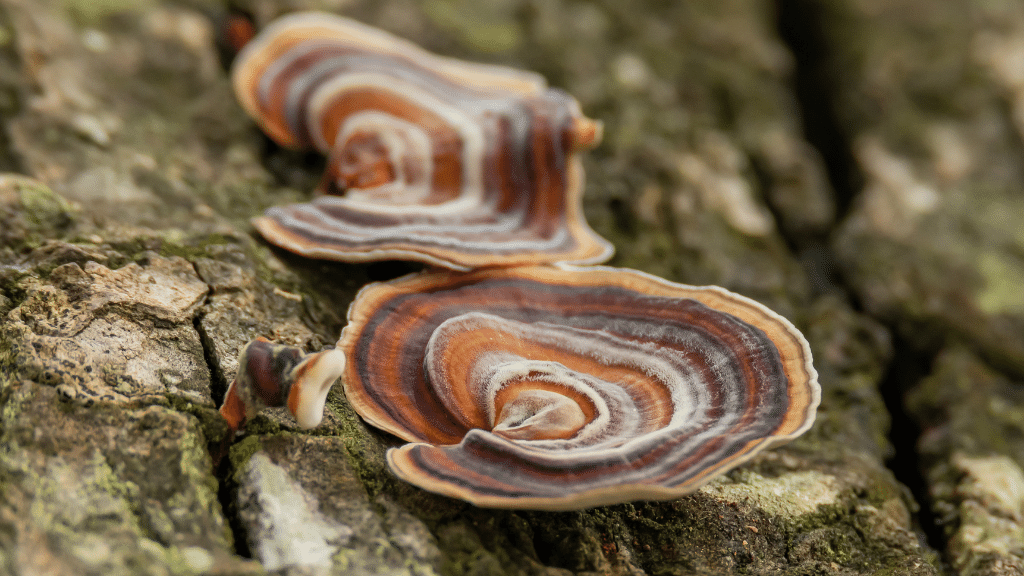


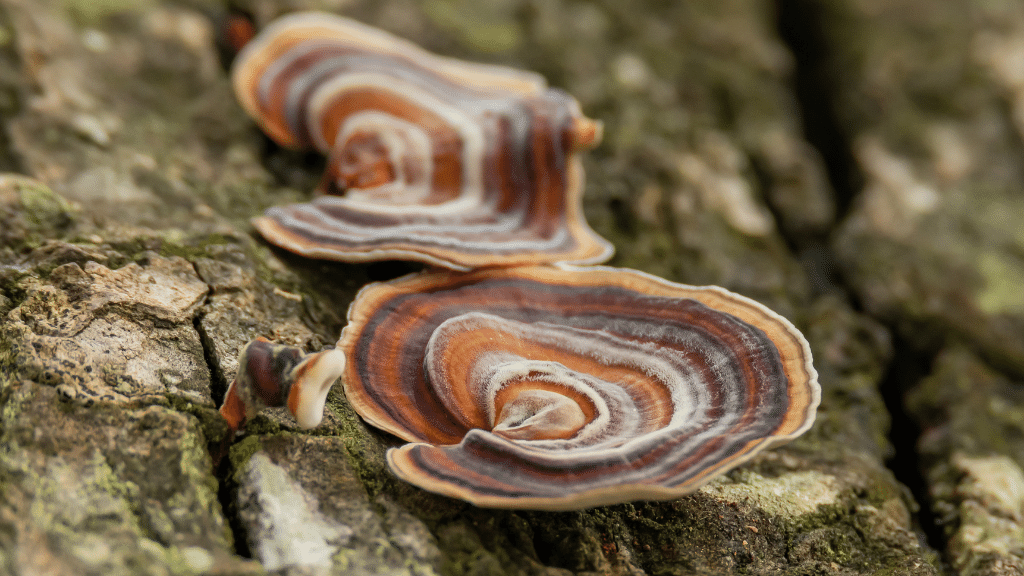


.png)
